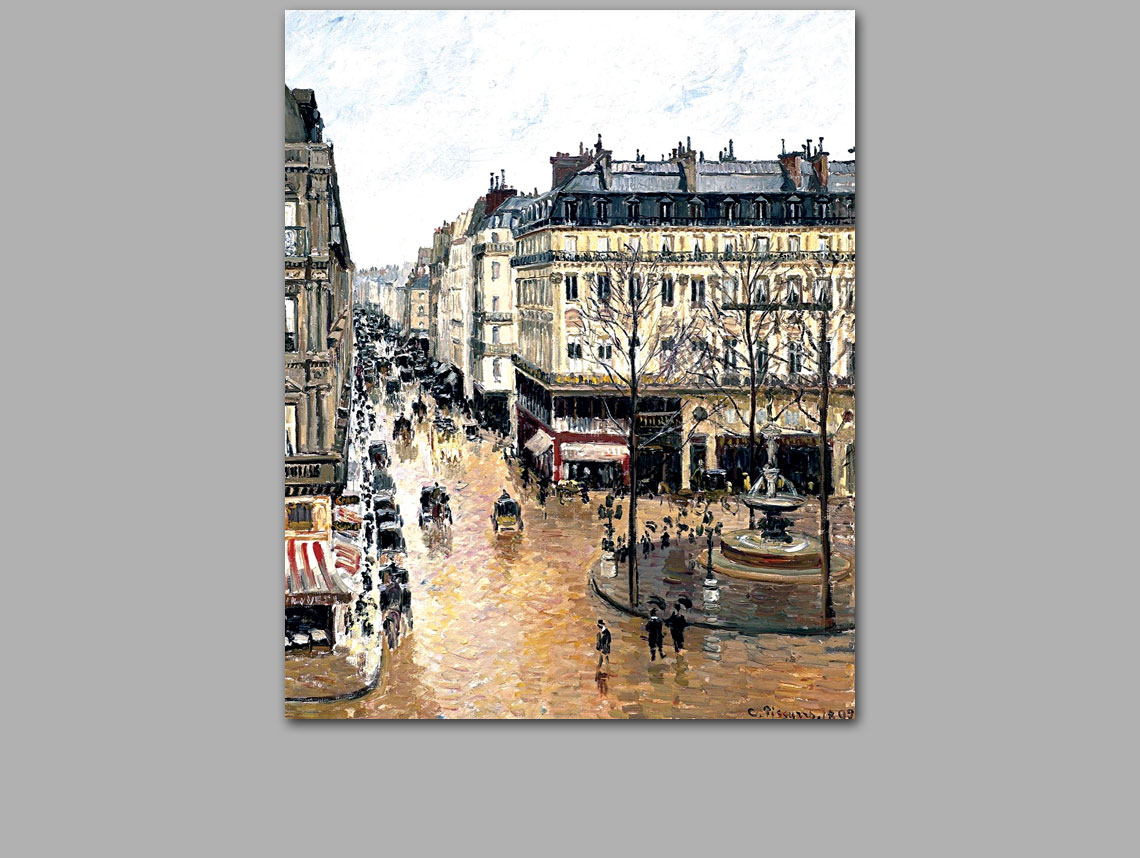 The Pissarro painting “Rue Saint-Honore in the Afternoon, Effect of Rain” is at the center of a lawsuit involving a California family pursuing the Nazi-looted art. Photo from Wikimedia Commons
The Pissarro painting “Rue Saint-Honore in the Afternoon, Effect of Rain” is at the center of a lawsuit involving a California family pursuing the Nazi-looted art. Photo from Wikimedia Commons California family trying to retrieve Nazi-looted artwork can sue the Thyssen-Bornemisza Museum in Madrid, where the painting hangs, for its return, the 9th U.S. Circuit Court of Appeals ruled on July 10.
“Every now and then, to have something go right, that’s a good thing and a reminder that people should behave better,” David Cassirer, a plaintiff in the Cassirer v. Thyssen-Bornemisza Collection case, told the Journal, referring to the museum’s refusal to return the painting. “Today was a major ruling in a major case in this category of Nazi-looted art, or the broader category of Holocaust-era asset claims.”
The painting, Camille Pissarro’s “Rue Saint-Honore in the Afternoon, Effect of Rain,” a Paris streetscape valued at more than $30 million, belonged to Lilly Cassirer, whose family bought it directly from Pissarro’s art dealer.
Cassirer, a German Jew, and her second husband, Otto, traded the painting for exit visas in 1939 after Kristallnacht.
Later, the piece was smuggled into the United States, where it was traded among specialists in Nazi-looted artwork in galleries in Los Angeles and New York until 1976, when Baron Hans Heinrich Thyssen-Bornemisza purchased it. It has hung in the Madrid museum since it opened in 1992.
In 1958, the German government gave $13,000 to Lilly Cassirer to cover the painting’s loss.
The Cassirer family thought the piece had been destroyed during the war. The family discovered its existence in 1999 after a friend of David Cassirer’s late father, Claude, Lilly’s grandson, saw the painting in a museum catalog and notified the family. Ever since, the Cassirer family has tried to get it back.
The recent court decision was a reversal of a 2015 dismissal by a Los Angeles District Court of the Cassirer family’s lawsuit against the Thyssen-Bornemisza Collection Foundation.
The plaintiffs in the appeal are David Cassirer and his sister, Ava, and the United Jewish Federation of San Diego County.
In the 60-page appeals court opinion, the presiding judge, Carlos Bea, said the district court decision left open the question of whether Thyssen-Bornemisza was an “accessory” to the theft of the painting.
The case is one of many instances of Jewish families affected by the Holocaust attempting to regain artwork that was taken from them under duress by the Nazis.
The Cassirer family watched closely the 2004 U.S. Supreme Court decision in the Maria Altmann case, which also dealt with Nazi-looted artwork. That ruling established that individuals seeking to recover stolen artwork do not need to go to the countries holding the artwork but can proceed with civil action in U.S. courts.
“When the Supreme Court said we don’t have to go to the country holding it, this became doable and practical,” said David Cassirer, who divides his time between California and Colorado.
“We were able to pitch it to attorneys who would help us. We can have Spain come here and answer us for their action.”
The Cassirer family’s legal team includes David Boies, who represented Al Gore in the case that decided the 2000 presidential election, Bush v. Gore, and the plaintiffs in the challenge to California’s ban on same-sex marriage, known as Proposition 8.
In the current case, the plaintiffs argued that the museum’s claim to the painting — that it had been in the collection for more than six years and thus, under prescriptive Spanish law, belonged to the museum — was void. They further claimed that even if the museum purchased the painting not knowing it was looted, it benefited by having the painting and was thus an accessory to the theft.
The appeals court ruling said Lilly Cassirer’s acceptance of payment from the German government did not foreclose her claim to the painting.























 More news and opinions than at a Shabbat dinner, right in your inbox.
More news and opinions than at a Shabbat dinner, right in your inbox.